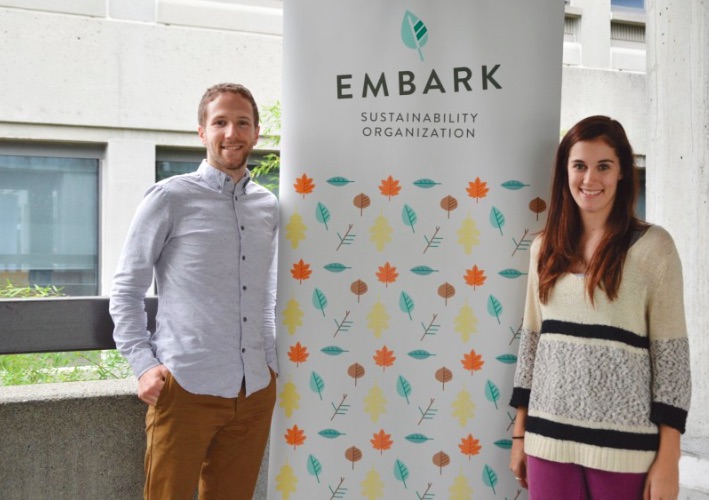. . SUSTAINABLE DEVELOPMENT . .
An article by Emma Warner Chee, The Peak, SFU student newspaper
In light of the 50th anniversary of SFU [Simon Fraser University], Embark (formerly Sustainable SFU), SFU 350, and Divest SFU believe it is the perfect time for the university to become a leader in the climate justice movement, starting with a divestment from the fossil fuel industry. The groups are collaborating to launch a divestment campaign this fall that will see various actions and events in the months to come.

Embark is among three student groups pushing SFU to divest from fossil fuels. Image Credit: Lisa Dimyadi
The extraction and consumption of fossil fuels account for the greatest level of carbon emissions by humans, and are thus the greatest threat to the climate. A report from the UN’s International Panel on Climate Change last year indicates that if carbon emissions are not drastically reduced by 2017, and global temperatures rise by just two degrees celsius, the effects of climate change would be irreversible.
As fourth-year environmental science student and Divest SFU campaigner Tessica Truong pointed out, the impacts of climate change are already being felt in the global south.
Sea levels and temperatures are rising, land is disappearing, drought is causing food insecurity, and the occurrence and severity of natural disasters is increasing, all of which are causing displacement and creating climate refugees.
Truong stated, “It is unethical to be profiting from fossil fuels as an educational institution, when the effects of fossil fuels on the climate are being paid for by others around the world.”
Started in 2013, the Divest SFU campaign was created to petition the SFU Board of Governors to take their endowment fund investments out of the fossil fuel industry in an effort to limit the growth of the industry.
(Article continued in the right column)
See comment below.
(Article continued from the left column)
They approached the board in the spring of 2014 with the backing of student groups on campus as well as many faculty members, some showing their support by signing off on an open letter to administration.
The university consequently adopted the United Nations’ Principles for Responsible Investment and also created the Responsible Investment Committee in 2014, the latter of which aims to “review and make recommendations related to responsible investment proposals,” among other responsibilities.
Following the presentation, SFU released this statement from former VP Finance and Administration Pat Hibbitts: “The Divest SFU students made a compelling case about the role of investment in economic policy and we considered their request seriously.” She continued. “This new policy provides for governance of our investment strategy consistent with the UN PRI and our investment objectives.”
However, as Divest SFU sees it, no definitive action has been taken toward divestment, and the campaign continues.
Divestment from fossil fuel campaigns have been taking off in universities across Canada, the United States, and Europe. Stanford University, for instance, has been successful in convincing their board of governors to divest from the coal industry, and is now working toward divestment from all fossil fuels.
At McGill University, students set up a tent city on campus to protest the university’s fossil fuel investment. UBC350 held a referendum in which 77 per cent of students and 62 per cent of faculty voted in favour of divestment. Other institutions, such as Vancity credit union, proudly state that they are not invested in the fossil fuel industry.
One of the main arguments against divestment is that with the world’s already heavy reliance on fossil fuels, it won’t change anything.
Truong acknowledged that “SFU alone will not stop fossil fuel industries, but we do have the power to change the direction, and show leadership.”
(Thank you to Janet Hudgins, the CPNN reporter for this article.)
Re: Canada: Students at Simon Fraser University launch divestment campaign
It takes considerable courage to get between an institution and its bankroller, questionable though this one is.
The now sidelined Canadian Conservative government and the Liberals before it, both neoliberal regimes, have been steadily defunding education for the last 20 or so years clearly with the intention to privatize. Lurking outside the Prime Minister’s Office the likes of Goldcorp, a Canadian extractor, an extreme violator of human rights abroad and which Stephen Harper, the ex-Tory prime minister, rigidly refused to regulate or call to account, waited to slip into the void as schools across the country pleaded for enough money to keep the lights on. SFU and other universities accepted the millions offered–and feel such shame they refuse to talk about it–jacked up tuition and then, seriously expanded. Now, you have to wonder where the money came from to renovate and rebuild most of the campuses, that you are stepping on and sitting on.
Canadian taxpayers used to fund all of grammar school and about 80% of university tuition. Now teachers and parents are paying for all extras and taxpayers about 44% of tuition. No Canadian ever objected to paying most of the tuition bill and although we are looking forward to a big change in government, the Liberals started the move toward privatization in 1993-4 and we have been given no reason to think they will reverse anything. Now, Goldcorp is entrenched; amassing huge tax breaks they have wormed their way insidiously into Main Street and are even influencing curricula all set up and handed to them by the Canadian government.
Meanwhile, the same government is again giving and taking away from students, offering tuition loans then charging them interest at 5.5% +/- when money is readily available from the national Bank of Canada at .5%, perhaps less for young people trying to get ahead.
It’s pretty gutsy of these kids to take on both the school and Goldcorp. They are, after all, working two, sometimes three jobs, most of them menial and miserably underpaid, while carrying a full load. The boomerang can come from both the school and the bankroller and it’s very capable of destroying young lives.